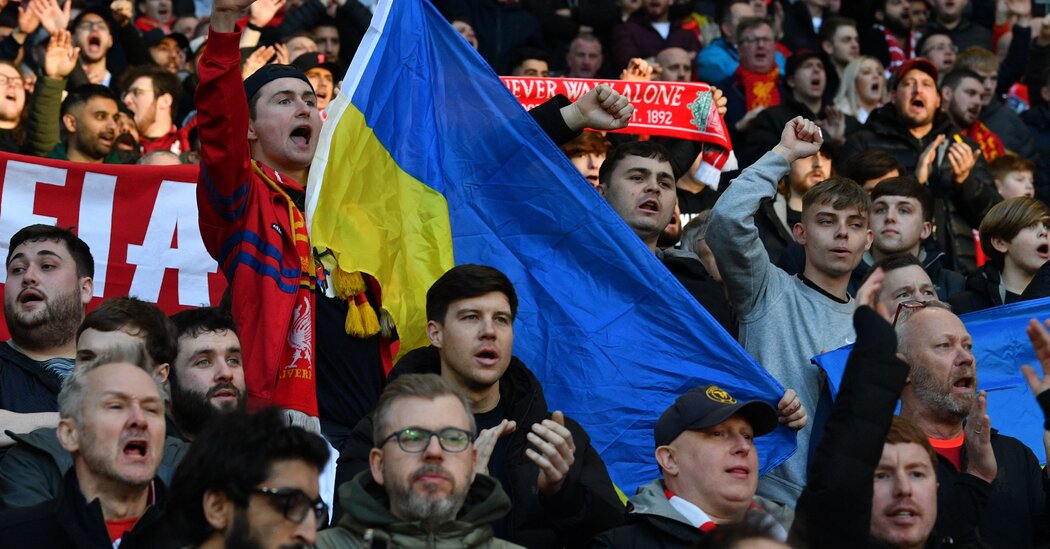The restrictions proposed by soccer’s governing body for a World Cup playoff next month stopped short of the all-out ban Russia’s opponents have demanded.
Under mounting pressure to take action against Russia after its invasion of Ukraine, the leadership of world soccer’s governing body on Sunday agreed on a range of measures that would take effect for Russia’s crucial World Cup qualifying playoff next month. But the proposals — a ban on Russia’s name, flag and anthem and a neutral site for its games — do not include the all-out ban on Russia’s national team that its opponents are demanding, making it unclear if the punishments will resolve the confrontation, or if the games will be played at all.
Russia was drawn against Poland in March as part of a four-team group for one of Europe’s final places in the World Cup in Qatar later this year. If Russia were to win its game against Poland, it would meet Sweden or the Czech Republic for a place in Qatar when the tournament opens in November. Russia’s first playoff match and the potential second game had been scheduled to be played in Moscow.
Bureau of the FIFA Council takes initial measures with regard to war in Ukraine
▶️ https://t.co/JoHzwIajiX pic.twitter.com/BarqeIDYaP
— FIFA Media (@fifamedia) February 27, 2022
The three other countries involved in the battle for the World Cup place — Poland, Sweden and the Czech Republic — have all refused to play Russia under any circumstances as a protest against Russia’s invasion of neighboring Ukraine.
Several top players, including Poland’s Robert Lewandowski, FIFA’s reigning world player of the year, have backed the decision to boycott any games involving Russia. Those statements, and similar ones by other players, have created intense pressure on FIFA to remove Russia from the competition.
Other soccer bodies have already taken action against Russia: European soccer’s governing body last week stripped St. Petersburg of this year’s Champions League final, and on Sunday England’s soccer federation said it would not play Russia in any international games for the foreseeable future “out of solidarity with Ukraine and to wholeheartedly condemn the atrocities being committed by the Russian leadership.”
Earlier Sunday, a group of FIFA top leaders sought to find a way out of the simmering confrontation by agreeing to penalize Russia: It ordered that its team would be allowed to play only in neutral venues and in empty stadiums; that it must play without its flag or national anthem, and only if its team agreed to be known as the Football Union of Russia, rather than Russia.
Cezary Kulesza, the president of the Poland soccer federation, called FIFA’s decision “totally unacceptable.” In a post on Twitter, he added: “We are not interested in participating in this game of appearances. Our stance remains intact: Polish National Team will NOT PLAY with Russia, no matter what the name of the team is.”
FIFA’s measures are only the first step in actions against the country’s soccer teams, said three senior soccer officials familiar with the organization’s discussions, and a harsher penalty — most likely an all-out ban on Russian teams — could be imposed if Russia’s attacks on Ukraine continue, or if it refuses to abide by Sunday’s penalties.
The measures mirror some of the penalties imposed against Russian teams by the International Olympic Committee after Russia was caught running a large, state-sponsored doping program; those punishments have been widely ridiculed as inadequate by athletes and Olympic officials from other countries.
They also may not be enough to persuade Russia’s rivals to agree to share a field with a Russian team, and put FIFA in the uncomfortable position of expelling three of its members from the playoff — and thus allowing Russia to advance unchallenged to the World Cup, soccer’s showcase event.
FIFA declined to comment beyond its statement on the proposed punishments against Russia, or the opposition of the three other federations who have vowed not to play it.
Understand Russia’s Attack on Ukraine
What is at the root of this invasion? Russia considers Ukraine within its natural sphere of influence, and it has grown unnerved at Ukraine’s closeness with the West and the prospect that the country might join NATO or the European Union. While Ukraine is part of neither, it receives financial and military aid from the United States and Europe.
Russia’s soccer federation, known as the R.F.U., meanwhile, rejected even the suggestion that it would not play the game, or games, as scheduled in Moscow.
“At the moment, the R.F.U. has not received any information from FIFA regarding the likelihood of postponing or canceling the World Cup qualifiers scheduled for March 24 and 29 in Moscow,” the Russian federation said. “We do not see any legal grounds for canceling the playoff game between the Russian and Polish national teams and the subsequent meeting with Sweden or the Czech Republic. The R.F.U. continues to prepare for these games.”
Russia, its top leaders and several wealthy individuals and companies have already been targeted by the West with heavy penalties that are having an immediate effect on life in the country, including a ban on air travel by Russian airlines to most parts of Europe. That prohibition would most likely make finding a venue for any game involving the Russian team difficult.
Russia is already widely considered a pariah in international sporting circles after a yearslong, state-backed doping program corrupted a series of international sporting events, including world championships and multiple editions of the Olympic Games.
If Russia’s team qualifies for the World Cup — and if it is allowed to play in the tournament — it will not be allowed to use its flag, play its anthem or be known by its regular name under an existing set of punishments issued two years ago by the global antidoping regulator. Those penalties do not cover qualification games.


























